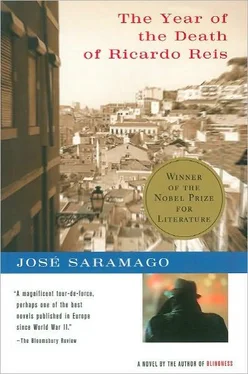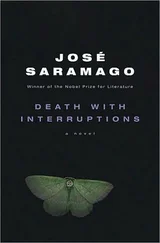José Saramago - Year of the Death of Ricardo Reis
Здесь есть возможность читать онлайн «José Saramago - Year of the Death of Ricardo Reis» весь текст электронной книги совершенно бесплатно (целиком полную версию без сокращений). В некоторых случаях можно слушать аудио, скачать через торрент в формате fb2 и присутствует краткое содержание. Год выпуска: 1992, ISBN: 1992, Издательство: Houghton Mifflin Harcourt, Жанр: Современная проза, на английском языке. Описание произведения, (предисловие) а так же отзывы посетителей доступны на портале библиотеки ЛибКат.
- Название:Year of the Death of Ricardo Reis
- Автор:
- Издательство:Houghton Mifflin Harcourt
- Жанр:
- Год:1992
- ISBN:9780547546926
- Рейтинг книги:4 / 5. Голосов: 1
-
Избранное:Добавить в избранное
- Отзывы:
-
Ваша оценка:
- 80
- 1
- 2
- 3
- 4
- 5
Year of the Death of Ricardo Reis: краткое содержание, описание и аннотация
Предлагаем к чтению аннотацию, описание, краткое содержание или предисловие (зависит от того, что написал сам автор книги «Year of the Death of Ricardo Reis»). Если вы не нашли необходимую информацию о книге — напишите в комментариях, мы постараемся отыскать её.
Year of the Death of Ricardo Reis — читать онлайн бесплатно полную книгу (весь текст) целиком
Ниже представлен текст книги, разбитый по страницам. Система сохранения места последней прочитанной страницы, позволяет с удобством читать онлайн бесплатно книгу «Year of the Death of Ricardo Reis», без необходимости каждый раз заново искать на чём Вы остановились. Поставьте закладку, и сможете в любой момент перейти на страницу, на которой закончили чтение.
Интервал:
Закладка:
...
After a night of severe winter, of violent storm, the latter two words, violent storm, have been linked together since their inception, the first pair not quite as much, but both phrases are so pertinent to the circumstance that they spare one the effort of having to invent new words, the morning might well have dawned with bright sunshine, blue skies, and joyful flutterings of pigeons in flight. But there was no change in the elements. The swallows continue to fly over the city, the river is not to be trusted, the pigeons scarcely venture there. It is raining, but tolerably for anyone going out with a raincoat and umbrella, and in comparison with the gales earlier this morning, the wind is a mere caress on one's cheek. Ricardo Reis left the hotel early, he went to the Banco Comercial to change some of his English money into escudos, and for every pound sterling he received one hundred and ten thousand reis. A pity those pounds were not gold, otherwise he could have changed them for almost double that amount. Even so, the returning traveler has no real cause for complaint, seeing as he leaves the bank with five thousand escudos in his wallet, a small fortune in Portugal. From the Rua do Comércio, where he finds himself, the Terreiro do Paço is only a few meters away, but Ricardo Reis will not risk crossing the square. He looks into the distance under the protection of the colonnades, the river dark and choppy, the tide high. When the waves rise offshore, one imagines they are about to inundate and submerge the square, but that is an optical illusion, they disperse against the wall, their impact broken by the sloping steps of the wharf. He recalls having sat there in days gone by, days so remote he doubts whether he really experienced them. It may have been someone on my behalf, perhaps with the same face and name, but some other person. His feet are cold and wet, he also feels a shadow of gloom pass over his body, not over his soul, I repeat, not over his soul. The impression is physical, he could touch it with his hands were they not both gripping the handle of his umbrella, which is needlessly open. This is how a man alienates himself from the world, how he exposes himself to the jesting of some passerby who quips, Hey mister, it's not raining under there. But the man's smile is spontaneous, without a hint of malice, and Ricardo Reis smiles at his own distraction. Without knowing why, he murmurs two lines from a poem by João de Deus, well known to every child in nursery school. Under this colonnade one could comfortably spend the night.
He came here because the square was so near and in order to verify in passing if his memory of the place, clear as an engraving, bore any resemblance to the reality. A quadrangle surrounded by buildings on three sides, a regal equestrian statue in the middle, a triumphal arch which he cannot see from where he is standing. But everything is diffuse and hazy, the architecture nothing but blurred lines. It must be the weather, the hour of day, his failing eyesight. Only the eyes of remembrance remain, as sharp as those of a hawk. It is almost eleven o'clock, and there is much activity under the colonnades, but activity is not the same thing as haste. This dignified lot move at a steady pace, all the men in soft hats, their umbrellas dripping, few women are in sight at this hour, the civil servants are arriving at their offices. Ricardo Reis walks on in the direction of the Rua do Crucifixo, resisting the insistent pleas of a lottery-ticket vendor who tries to sell him a ticket for the next draw. It is number one thousand three hundred and forty-nine, the wheel will spin tomorrow. That is not the number and the wheel will not be spinning tomorrow, but this is how the soothsayer's chant goes, a licensed prophet with a badge on his cap. Do buy a ticket, sir, if you refuse to buy, you will live to regret it, believe me, it's a winner. There is menace in this imposition. Ricardo Reis enters the Rua Garrett, goes up the Chiado, where four porters lean against the plinth of the statue, paying no heed to the drizzle. This is the island of the Galicians. Farther ahead it has actually stopped raining. There is a white patch of light behind Luis de Camoes, a nimbus. That is the trouble with words, nimbus signifies rain as well as cloud as well as halo, and since the poet is neither God nor saint, the rain stopping was merely the clouds thinning out as they passed. Let us not imagine that these are miracles like the ones at Ourique or Fatima, not even the simple miracle of the sky turning blue.
Ricardo Reis goes to the newspaper archives. Yesterday he made a note of the directions before going to bed. There is no reason to believe he slept badly, that he found the bed or country strange. When one awaits sleep in the silence of a room that is still unfamiliar, listening to the rain outside, things assume their real dimension, they all become great, solemn, heavy. What is deceptive is the light of day, transforming life into a shadow that is barely perceptible. Night alone is lucid, sleep, however, overcomes it, perhaps for our tranquillity and repose, the peace of our souls. Ricardo Reis goes to the newspaper archives, where everyone must go who wishes to know what has taken place, for here in the Bairro Alto the entire world passes, leaving footprints, broken twigs, trampled leaves, spoken words. What remains is this necessary invention, so that of the aforesaid world a face may be preserved, a look, a smile, a mortal agony. The unexpected death of Fernando Pessoa caused much sadness in intellectual circles. The poet of Orfeu, an admirable spirit who not only composed poetry in original forms but also wrote cogent critical essays, died the day before yesterday, in silence, just as he had always lived. Since no one can earn a living in Portugal by writing literature, Fernando Pessoa found employment as a clerk in a commercial firm. Some lines further on, his friends left wreaths of remembrance beside his tomb. This newspaper gives no more information. Another reports the same facts with different words, Fernando Pessoa, the extraordinary poet of Mensagem, an ode of patriotic fervor and one of the most beautiful ever written, was buried yesterday, taken unawares by death in a Christian bed at the Hospital of Sao Luis during the late hours of Saturday night. In his poetry he was not only Fernando Pessoa but also Alvaro de Campos, Alberto Caeiro, and Ricardo Reis. There you are, an error caused by not paying attention, by writing what one misheard, because we know very well that Ricardo Reis is this man who is reading the newspaper with his own open and living eyes, a doctor forty-eight years of age, one year older than Fernando Pessoa when his eyes were closed, eyes that were dead beyond a shadow of doubt. No other proofs or testimonies are needed to verify that we are not dealing with the same person, and if there is anyone who is still in doubt, let him go to the Hotel Brangança and speak to the manager Senhor Salvador, ask him if there is not a gentleman in residence there called Ricardo Reis, a doctor, newly arrived from Brazil. He will say Yes, the doctor said he would not be back for lunch but would almost certainly be dining here this evening, if you would care to leave a message, I shall see that he receives it. Now who will dare impugn the word of a hotel manager, an excellent physiognomist and well practiced in establishing identities. But rather than satisfy ourselves with the word of a man whom we cannot claim to know intimately, here is another paper which has reported the news on the page under obituaries. It outlines his career in detail, Yesterday there took place the funeral of Fernando Antonio Nogueira Pessoa, bachelor, forty-seven years of age, forty-seven, take note, born in Lisbon, studied literature at an English university, became established as a writer and poet in literary circles, on his coffin were placed sprays of wild flowers, worse luck for them, as they wither so quickly. While he is waiting for the tram that will take him to Prazeres, Doctor Ricardo Reis reads the funeral oration delivered at the graveside, he reads it near the place where a man was hanged, as everyone knows, almost two hundred and twenty-three years ago, during the reign of Dom João V, who is not mentioned in the Mensagem. They hanged a Genoese swindler who for the sake of a piece of cloth killed one of our countrymen, stabbing him in the throat with a knife, then doing the same to the dead man's mistress, who died on the spot. He then inflicted two wounds on their servant, which were not fatal, and put out another's eye as if he were a rabbit. The murderer was arrested, and sentenced to death here, since it was near the house where he committed the crimes, in the presence of the crowd that had gathered to watch. Scarcely comparable with this morning in nineteen thirty-five, the month of December, the thirtieth to be precise, the sky overcast, and only those who cannot avoid it out walking in the streets, even though it is not raining now as Ricardo Reis, leaning against a lamppost at the top of the Calçada do Combro, reads the funeral oration. Not for the Genoese swindler, who did not receive one, unless you count the insults of the rabble, but for Fernando Pessoa, poet and innocent of any murders. Two words about the poet's earthly passage. For him two words suffice, or none. Indeed silence would be preferable, the silence that already enshrouds both him and us and which is in keeping with his temperament, for what is close to God is close to him. Yet those who were his peers in extolling beauty should not, could not have allowed him to descend into the earth, or rather ascend to the final horizons of Eternity without voicing their protest, calm yet aggrieved at this departure, the companions of Orpheus, more brothers than companions, who pursued the same ideal of beauty, they could not, I repeat, abandon him in this final resting place without having showered his gentle death with the white lilies of silence and suffering. We mourn the man whom death takes from us, and the loss of his miraculous talent and the grace of his human presence, but only the man do we mourn, for destiny endowed his spirit and creative powers with a mysterious beauty that cannot perish. The rest belongs to the genius of Fernando Pessoa. Come now, come now, exceptions can fortunately still be found to the normal rules of life. Since the time of Hamlet we have been going around saying, The rest is silence, in the end it's genius that takes care of the rest, and if this genius can do it, perhaps another genius can too.
Читать дальшеИнтервал:
Закладка:
Похожие книги на «Year of the Death of Ricardo Reis»
Представляем Вашему вниманию похожие книги на «Year of the Death of Ricardo Reis» списком для выбора. Мы отобрали схожую по названию и смыслу литературу в надежде предоставить читателям больше вариантов отыскать новые, интересные, ещё непрочитанные произведения.
Обсуждение, отзывы о книге «Year of the Death of Ricardo Reis» и просто собственные мнения читателей. Оставьте ваши комментарии, напишите, что Вы думаете о произведении, его смысле или главных героях. Укажите что конкретно понравилось, а что нет, и почему Вы так считаете.












